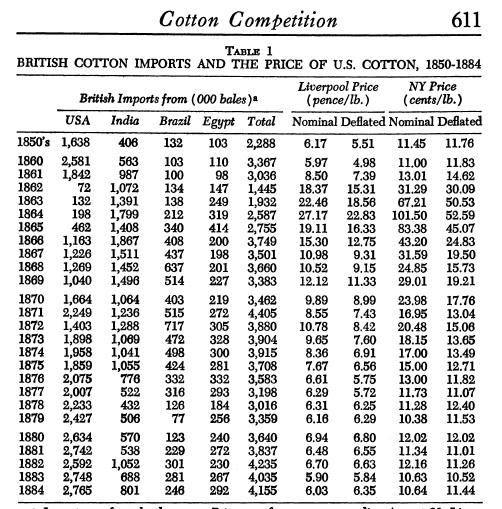Good post.
There is some kind of case for industrialisation, but there are a number of key drawbacks.
I'm trying to understand what we're taking about here, because internationally, the CS is already comparatively industrialized in 1860. Ditto x2 for the OTL Southern states in the 1880s and 90s. The CSA will never be the powerhouse that the US or UK would be. But will they be "industrialized"? Of course they would.
First - infrastructure. The South had serious infrastructure issues that would hinder the hypothetical Confederacy's emergence and industrialisation. Essentially, it was disconnected and colonial. There was, apart from the Mississippi, no central or interconnected pathway for transport and trading.
Well, there's the Tennessee, the Cumberland, and the Ohio rivers. Those are pretty significant, but no, there's not a river system that connects Virginia to Texas.
They were connected by poor quality roads, and short stretches of railway with varying gages and often poor quality. The mis-matched transportion network of roads, rails and waterways meant that goods moving within the Confederacy would have to be transshipped at increasing costs. The Confederate cities and population centers did not connect to each other, they connected to the markets. This mean that it was comparatively more expensive to ship goods within the confederacy than it was to import and export goods. This would, in the absence of heavy tariffs, tend to discourage domestic industry. At the very least, it would tend to give importers and exporters a competitive advantage over homegrown.
This is all true, and are all reasons why the CS would struggle to be on par with the US economically. But the points are all relative. By the standards of the 1860s, the CS is well on its way to being an industrialized nation. The 9500 miles of railroads within the Confederacy are more than almost anywhere else in the world. More than France, Germany, Russia, etc. Not more than the US, but its important to catch the distinction between "small compared with the US" and "small compared with the rest of the world." For comparison's sake, Brazil had 233 km of railroads in 1860. About the same for Mexico.
Heavy tariffs are extremely unlikely for a Confederate economy built on cotton exports, and massive investment in infrastructure, canals, a coherent rail system, is essentially prohibited by the Confederate constitution.
The resistance to a tariff in the minds of Southern politicians quickly eroded in the face of the reality of governing. Manufacturing interests lobbied hard for a tariff (it excluded cotton) during the formation of government in 1860. I don't see why, after a war in which on the fly manufacturing saved their asses, that manufacturers would lose influence. They're richer and more respected.
Second - Finance. There was no financial structure worthy of the name. There were no substantial banks or lending institutions. There were no internal mechanisms for finance or to move and invest capital. Typically, as a result, Confederate investment tended to be in consolidating tangible assets, land and slaves. While the frequent response is 'well, they'll get foreign investment' there's actually a lot of competition for foreign investment from the United States, Canada, the British and French Colonies, Europe, Russia, etc. I don't see any reason why the Confederacy would be extraordinarily competitive. Most likely, foreign investment would be limited and deployed to service a neocolonial economic model, rather than industrialisation.
Again, there's some truth to what you're saying, but it has to be looked at in context. You're talking about what would have been the fourth richest country in the world in 1860--with an excellent tranportation system by the standards of the time, high rates of literacy, and sizable manufacturing interests. Those are the reasons the Confederacy would be a competitive destination for foreign investment. There's plenty of collateral to get loans. Only through a series of unfortunate events will the South turn into a colony in the true sense of the word.
Third - Markets. The Confederacy doesn't have any. European states, even the ones that lagged in industrialisation, typically had fairly large dense populations in comparison to America, and they were also proximate to other European states. So there were potential markets all over the place, and rich potential markets in proximity. Several European countries, particularly Britain, but also France, the Netherlands, Denmark maintained and had substantial merchant marines, their ships and seagoing traditions extended all over the world.
Good point.
I don't see it making waves successfully in Latin America or Asia.
That's where I'd disagree.
This doesn't mean that the Confederacy can't industrialize. But I think it would require a degree of state intervention and planning comparable to the Asian economies or Scandinavia in the latter half of the 20th century. This in itself seems unlikely for this era, and particularly for the culture and political set up of the Confederacy.
The CS government intervened in the markets to a degree that was unprecedented in American history. And of course, it was wartime, yada yada. But the precedent is there.
Absent such intervention, and assuming basically a laissez fair model of economic drift, my assumption is that the Confederacy would at best experience a partial industrialisation blooming briefly for a time, but fading away as a result of limited production runs, lack of capital investment, difficulties getting to market, lack of reinvestment and updating. It would probably peak out about 1880, be well into decline by 1890, and pretty much be dead by 1910. The most likely, though imperfect model is the commodity driven agrarian economies of Latin America.
But IOTL, the South industrialized exponentially as time went on, with many of the same problems, and fewer advantages. There are some offsets--the CS lack of a merchant marine vs the OTL wipeout of wealth, for example--but I think the balance indicates advantages outweighing disadvantages.
